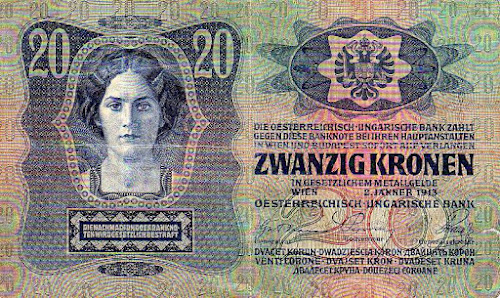After Archduke Ferdinand succumbed to a reckless bullet it took less than a half decade for his farytale empire to fall apart.
The European Union and its more careless tentacles can sometimes be confused with a soft-form update on the wandering ghosts of Augustus or Wilhelm, and the Euro its zenith.
The Austro-Hungarian Empire was, as its name suggests, not a nation but a collage of nations all under a kind of split monarchy. For most of its history it did not have to deal with democracy in modern form, although fealty had to be paid to the clever elites of whatever group happened to be shouting that day.
To Hitler, the Empire was an example of what happened when ethnic mixing co-incided with a light or nonsense political structure, and his anti-semitism was kindled in multi-ethnic Vienna, where he saw in the apparent bedlam an opportunity. To foreign crowns of all stripes and shapes it was a confused and flailing peacock waiting for a push in one direction or another. And never was it what could be described in textual form as a nation, its strictures and structures a combination of Pale Fire's 'distant northern land' and Castle Gormenghast.
But then again, it seemed to plod along quite well for nearly a millenium, so must have had something going for it. In comparing it to the EU, and its medium of exchange to the euro, one has to be soft and deft footed, because it survived and traded and haphazardly grew for a very long time, and was only sundered by a grave external event, and the fate of the EU is still dim and hard to make out.
And also to note that for many ethnic groups the Empire formed for them a clear identity, not the jumble it appeared to outsiders, and they subscribed to its (cultured) flag. Sigmund Freud and the writer Joseph Roth both lamented its passing as a personal tragedy. As Freud said, 'I do not want to live anywhere else... I shall live on with the torso and imagine that it is whole'. A cultured elite can come to defend and rely on a vague multi-national polity, and that is no bad thing.
A harsh segment of modern economics emerged from its dusty gold-leaf glitter, in the phlanax of the Austrian School, and especially in Fredrich von Hayek and Ludwig von Mises, whose adherents were loud as the last century closed.
One of the more curious things to happen was the collapse of the old currency, the Krone. It appeared in its mummified form about 1892, when in an effort to wrestle the Empire into the future, the Austro-Hungarian finance ministry introduced the new notes to their grateful subjects.
This little niblet, pictured here, may have passed paws in its life from Czech farmer to Vienesse kulturati to Ashkenai merchant or Hungarian miner.
And it was a trusted currency, up until the 1910's, with a hard tie to gold. Indeed, the institutions of the Empire were so deep and respected that they still dominate the social structure of its previously subject nations. The 'Hapsburg Effect' has emerged as an explanation for this subtle tendency (worldwide).
In the rocky road from Vienna to Brussels there is even a dim skeleton of the old Empire with a walk-on role. Otto von Hapsburg, the last Crown Prince of the Empire, and who died last year, acted as a bridge from turret to glass, and was a great believer in the EU as vague successor to his lost land.
So perhaps the lesson is that unlikely groupings can endure for unusual lengths of time, that weird rituals and incomprehensible statutes can lead to a vague pride over the decades, even in the absense of logic, and that if an elite wills it for long enough, it really does take an unusual cataclysm to undo the castle. But this is a sample of one.

No comments:
Post a Comment